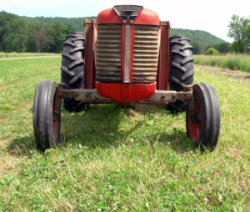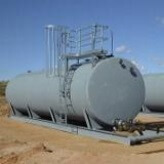How Biofuels Have Changed the Fuels We Use Today: Part 3
As a service to our customers, dealers and friends, Bell Performance hosts quarterly webinars on fuel topics of interest to them and their customers....
2 min read
Bell Performance : Jul 12 2011

The equipment used in agriculture covers a wide range from small two-cycle engines to large crop planting and harvesting equipment. A lot of farm equipment is used on a seasonal basis and will require special attention when idled for long periods of time. The long-term storage of the fuel needed to run this equipment also creates some real challenges to prevent it from degrading and rendering it unusable.
 Ethanol-blended gasoline will absorb moisture from the air and when it reaches the saturation point, will go through phase separation - a process whereby the ethanol will combine with the absorbed water and sink to the bottom of the fuel tank where the fuel pickup line is located. When this mixture of ethanol and water is drawn into the engine it will prevent it from starting. Worst yet, the gasoline above the water and ethanol phase has now been stripped of its octane. Any attempt to burn this gasoline in a piece of equipment can result in major engine damage. Claims made by some additive manufacturers offering products that fix phase-separated gasoline are false. Phase-separated gasoline cannot be fixed and must be discarded.
Ethanol-blended gasoline will absorb moisture from the air and when it reaches the saturation point, will go through phase separation - a process whereby the ethanol will combine with the absorbed water and sink to the bottom of the fuel tank where the fuel pickup line is located. When this mixture of ethanol and water is drawn into the engine it will prevent it from starting. Worst yet, the gasoline above the water and ethanol phase has now been stripped of its octane. Any attempt to burn this gasoline in a piece of equipment can result in major engine damage. Claims made by some additive manufacturers offering products that fix phase-separated gasoline are false. Phase-separated gasoline cannot be fixed and must be discarded.
Equipment idled by seasonal use can experience deterioration of parts made of rubber, plastic, aluminum, steel, and fiberglass. Rusting, fuel system clogging and varied damage to engine parts and components can occur. Older pieces of equipment are more prone because their components were not designed to resist the corrosive effects of ethanol.
Ethanol is a very good cleanser/solvent and will loosen gum and sludge deposits in fuel tanks and fuel lines. This can result in fuel filter plugging which causes engines to shut down or it can cause a no-start condition. Ethanol can also cause a motor to run lean on fuel, due to the water that will not burn and takes the place of fuel. Lean fuel mixtures are very hot and can result in damage to internal engine components. Vapor locking is also a problem because ethanol will vaporize at lower temperatures than gasoline and will block the flow of fuel to the carburetor and fuel injectors. Vapor locking will cause an engine to shut down or prevent startup until the engine cools down. Two-cycle equipment is even more susceptible to damage or destruction when using ethanol-blended gasoline because absorbed water can block internal engine lubrication.
To eliminate the destructive effects of ethanol on agricultural equipment, it is very important to be proactive with a preventive maintenance program where the proper fuel additives are used. Bell Performance Mix-I-Go, Mix-I-Go Small Engine, and Marine MXO will prevent water and ethanol from combining (thus preventing phase separation). They will also remove existing water, stabilize gasoline to extend fuel life in idled equipment or storage tanks, clean carburetors and fuel injectors, and will put a protective coating on fuel system components to protect them against the corrosive damaging effects of ethanol.
You can take steps to protect the sizeable investment you've made in your farming and small equipment. Don’t let ethanol damage rob you of your investment.

As a service to our customers, dealers and friends, Bell Performance hosts quarterly webinars on fuel topics of interest to them and their customers....

Gasoline engines that work to give power to boats face more danger from water contamination than land-locked gas engines. Marine gasoline engines run...
If you run a business in the fuels industry, the problems of your customers are, really, your problems. When your customers think about the ethanol...